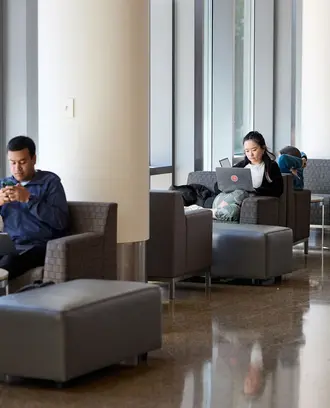As Executive Director of the MIT Task Force on the Work of the Future, Elisabeth Reynolds coordinates a distinctly MIT initiative. “This is one of the only places in the world where top economists, aerospace engineers, urban planners, political scientists, neurologists, mechanical engineers, anthropologists, and management professors are collaborating to answer one of the most pressing questions of our time,” she says. “How can we leverage emerging technologies and policies to create shared prosperity?”
Getting it right, Reynolds asserts, will increase business productivity and broaden economic benefits, provided that new technologies are deployed in ways that support workers and make jobs more meaningful.
“The doomsday scenario is not unfolding—yet. We are far from the point where AI and robotics can replace vast numbers of American workers. But we must lay the proper foundation now to produce positive social outcomes from the current wave of innovation.”
Far from altering the thinking of the task force, the pandemic and the current racial reckoning have only heightened the sense of urgency about its findings. These three questions are driving the group’s work:
- How are emerging technologies transforming the nature of human work and the set of skills that enable humans to thrive in the digital economy?
- How can we shape and catalyze technological innovation to complement and augment human potential?
- How can our civic institutions ensure that the gains from these emerging innovations contribute to equality of opportunity, social inclusion, and shared prosperity?
Who is at risk and what are our responsibilities?
The overarching premise of the group’s final report is that momentous impacts of technological change in AI and robotics are coming, but they are unfolding gradually.. “Our challenge going forward will be the quality of work not the quantity of work,” adds Reynolds. “Unfortunately, whatever productivity gains we’ve seen in recent decades haven’t translated into higher living standards, better working conditions, greater economic security, or improved health and longevity for the majority of workers.”
The U.S. tax code—and its considerable influence on the labor market—is one area of particular concern to the task force. Tax rates of 5% on software and equipment investments, for example, have exerted a strong bias toward “so-so technologies” that replace, but don’t improve on, low-level human work. By contrast, labor has been taxed at an average rate of roughly 25% for decades. Such incentives costs jobs but don’t amount to much in terms of increased productivity.
“The great promise of AI and robotics technologies,” says Reynolds, “is to make workers more insightful and productive, rather than to make them redundant. We must create incentives to invest in human capital and double down on our support for training programs that lead to a higher order of skill sets for our most vulnerable workers. Some firms are beginning to see the wisdom of creating such pathways, but much more concerted public/private action is needed if we are to succeed in creating careers in middle-wage jobs and ensuring the benefits of innovation are more broadly shared . Community colleges, online learning, and sectoral employment programs all have crucial roles to play in tackling this challenge.”
Restoring the role of workers as stakeholders
The task force’s report emphasizes that the U.S. is an outlier among market economies in its veneration of pure shareholder capitalism. According to the report, “shareholder capitalism, taken to its logical extreme (as in the United States), fails to appropriately internalize the external costs that firms impose when they make business decisions or adopt business practices that directly affect their workers and the communities in which they operate.”
In the view of the task force, a reevaluation of pure shareholder capitalism is essential for two reasons—economic efficiency and more productive employer-employee collaborations. When workers are underrepresented on a large scale, organizational decisions fail to account for the actual costs of job cuts on workers and on our society as a whole. Because current U.S. labor relations law discourages experimentation in worker representation, firms are mired in the unproductive, adversarial relationships carried over from the previous century.
“The great advances of the 21st century will be driven by innovation that fosters inclusion and worker advancement,” says Reynolds. “The most successful business leaders of this new era will be those who adopt new technologies that replace the mundane, low-level tasks of people’s jobs rather than the jobs themselves and improve worker productivity as well as overall job quality. This approach can lead to higher skill levels and greater productivity for the vast majority of workers. Strengthening our institutions that support workers while investing in innovation to develop the jobs and industries of the future will put us on the right track to create more widely shared prosperity. That’s how we push innovation in directions that will benefit our nation.”
Read The New York Times article about the task force.



